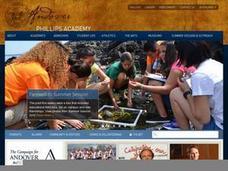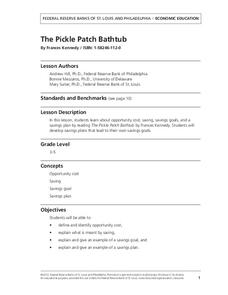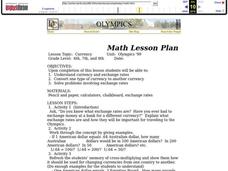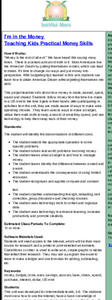Curated OER
Money, Banks, & Financial Institutions
Students engage in a study of financial institutions that includes the banking industry. They participate in a research study using different resources. They are introduced to the concept of bartering and how it is used as a replacement...
Federal Reserve Bank
Something Special For Me
People often save money, but what are the benefits and drawbacks of that action? Youngsters learn about saving, savings, and opportunity cost through the lens of a short book, called Something Special for Me.
Council for Economic Education
A Penny Saved
A penny saved is a penny earned! Scholars research the different ways to save money over a lifetime. They investigate the Rule of 72, compound interest, and sub-prime loans to gain an understanding of how banks aid in the saving process....
Federal Reserve Bank
The Pickle Patch Bathtub
What do your pupils want to save up their money for? Based around the book The Pickle Patch Bathtub, this lesson covers opportunity cost, saving, and spending. Learners participate in a discussion and practice making their own...
Curated OER
How Banks Create Money
Learners participate in a simulation game to discover the role of banks in creating checkbook money through lending practices. They play a lending and borrowing game and use a money multipiler equation to solve problems associated with...
Curated OER
There's No Business Like Bank Business
Students participate in a role play where they see how a bank works and how interest is paid by having money in the bank. In this bank lesson plan, students operate a bank and learn about saving, accounts, deposits, withdrawals,...
Curated OER
Money Matters!
Students get to build a piggy bank and experiment with coin denominations. Students gather parents and community volunteers to join with them for this class art project. Students and volunteers papier-mache an original piggy bank.
Curated OER
Lesson 3: What Happens When a Bank Makes a Loan?
Young scholars role-play to show how bank loans made to people can have an impact on others in the community. In small groups, they analyze hypothetical loans, using flow charts or other diagrams to describe the probable impact of each.
Curated OER
Credit as Currency: Ancient World History
Students examine use and principles of currency as it relates to the establishment and continuation of credit and banking systems.
Curated OER
Banking Account Options
High schoolers explore and discuss the various account options available to them at the bank. They create a paragraph stating the pros and cons of each kind of banking account. This instructional activity is intended for students...
Curated OER
Banking And Making Change
Twelfth graders simulate making purchases based on infromation located in supermarket flyers. Working in groups, 12th graders alternately make purchases and calculate change from a given amount. Students role play common bank...
Curated OER
Lesson 3: Where Does Money Come From?
Students listen to story Hundred Penny Box by Sharon Bell Mathis, explore history of money, and examine how money is produced in the United States. They discuss why money is used for exchange, and describe how money has changed over time.
Curated OER
Piggy Bank Math
Students practice solving money problems. In this counting coins lesson plan, students follow the outlined steps and use mixed operations to determine the coin combinations needed to solve a math word problem.
Curated OER
Opening A Bank Account
Young scholars identify the different types of accounts offered by local banks. Students review and define appropriate banking terms when opening an account. Working in pairs, young scholars role play the proper way to open an account....
Curated OER
Describe How Money Barter, and Credit Were Used in Colonial Virginia
Fourth graders listen as the teacher lectures about bartering. They work in small groups to define and create a skit about one term related to bartering. Students create an Economic Terms booklet. They review that tobacco was a cash crop...
Curated OER
Economy Introduction: Jack and the Bank Stock
Third graders explore the functions of money. In this economics lesson plan, 3rd graders read Jack and the Beanstalk to discover the three main functions of money.
Curated OER
Spending Money
First graders practice adding monetary values. In this money lesson, 1st graders discuss fair trades and then use coin values to purchase items from a class store. A video titled "Blossom and Snappy Go to the Bank, Part Two".
Curated OER
Coins
Second graders observe and demonstrate how to count the value of assorted coins. They discuss a story from their Math Storybook, and as a class solve a variety of problems using activity sheets. Students then independently complete a...
Curated OER
Let's Learn About Money
In this let's learn about money worksheet, learners explore how every coin has a fixed value. Students solve the answers to seven word problems associated with money.
Curated OER
Spending Money
Students complete activities to study the value of money. In this money study lesson, students read a story about money and discuss how they earn money at home. Students watch a related video clip and create a class book about the ways...
Curated OER
Currency
Students investigate currency and exchange rates. In the middle school mathematics lesson, students use ratio and proportion to convert from one type of currency to another. Students solve problems involving currency exchange.
Curated OER
Let's Find Out About Money
First graders investigate the uses and development of money as part of the study of finance. They focus upon the recognition of different coins and identify the value of each. Then students solve problems involving money and coins.
Curated OER
Let's Find Out About Money
First graders identify coins (pennies, nickels, dimes and quarters), and their attributes, including physical characteristics and value.
Curated OER
I'm in the Money - Practical Money Skills
Students make a budget and utilize math skills to keep a record of what they spend. They use technology and spreadsheets to help them keep track of their money.























